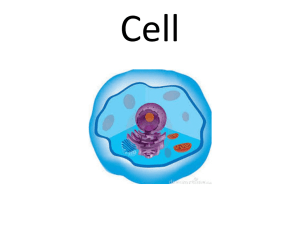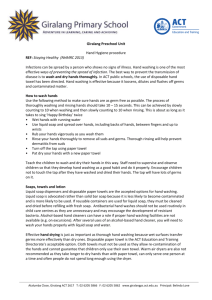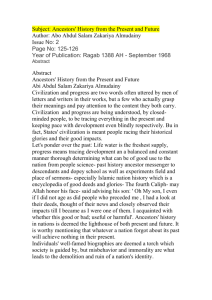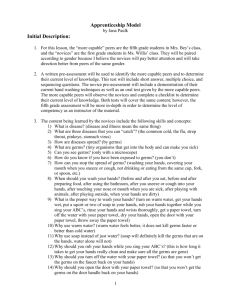Communication Project - Rowan University
advertisement
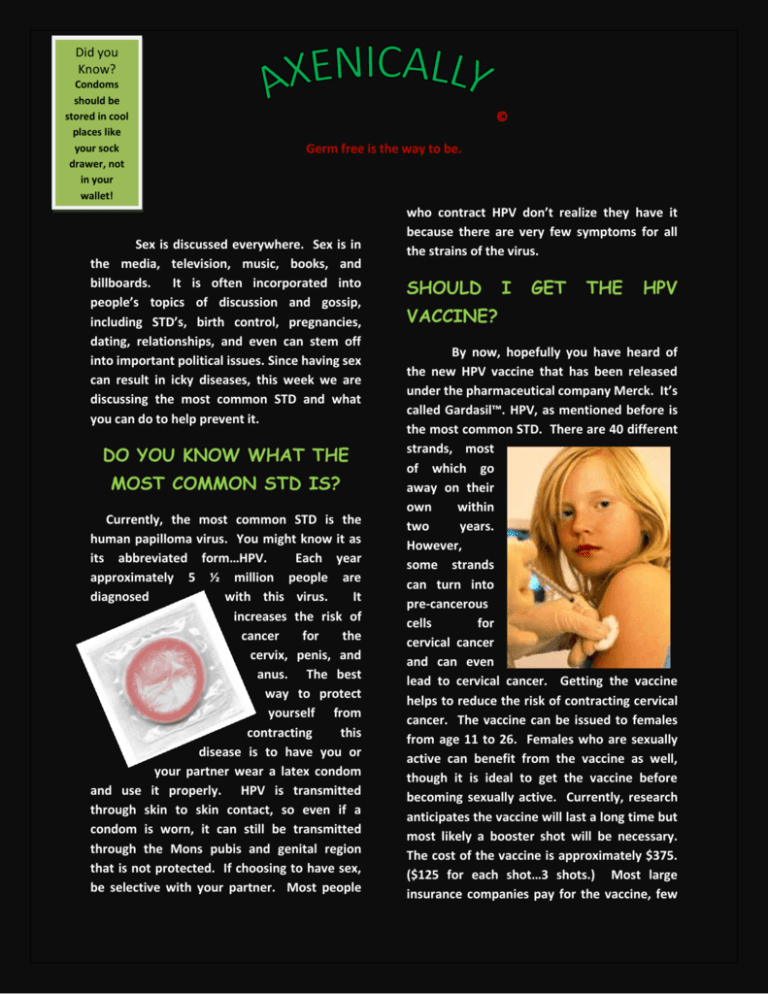
Did you Know? Condoms should be stored in cool places like your sock drawer, not in your wallet! © Germ free is the way to be. Sex is discussed everywhere. Sex is in the media, television, music, books, and billboards. It is often incorporated into people’s topics of discussion and gossip, including STD’s, birth control, pregnancies, dating, relationships, and even can stem off into important political issues. Since having sex can result in icky diseases, this week we are discussing the most common STD and what you can do to help prevent it. DO YOU KNOW WHAT THE MOST COMMON STD IS? Currently, the most common STD is the human papilloma virus. You might know it as its abbreviated form…HPV. Each year approximately 5 ½ million people are diagnosed with this virus. It increases the risk of cancer for the cervix, penis, and anus. The best way to protect yourself from contracting this disease is to have you or your partner wear a latex condom and use it properly. HPV is transmitted through skin to skin contact, so even if a condom is worn, it can still be transmitted through the Mons pubis and genital region that is not protected. If choosing to have sex, be selective with your partner. Most people who contract HPV don’t realize they have it because there are very few symptoms for all the strains of the virus. SHOULD I GET THE HPV VACCINE? By now, hopefully you have heard of the new HPV vaccine that has been released under the pharmaceutical company Merck. It’s called Gardasil™. HPV, as mentioned before is the most common STD. There are 40 different strands, most of which go away on their own within two years. However, some strands can turn into pre-cancerous cells for cervical cancer and can even lead to cervical cancer. Getting the vaccine helps to reduce the risk of contracting cervical cancer. The vaccine can be issued to females from age 11 to 26. Females who are sexually active can benefit from the vaccine as well, though it is ideal to get the vaccine before becoming sexually active. Currently, research anticipates the vaccine will last a long time but most likely a booster shot will be necessary. The cost of the vaccine is approximately $375. ($125 for each shot…3 shots.) Most large insurance companies pay for the vaccine, few do not. Side effects of the vaccine are mostly minor and include soreness at the injection site and in some cases have resulted in fainting. The vaccine doesn’t help to prevent all strands of the virus or all types of cervical cancer. Getting the vaccine is not a substitute for going to your doctor. Be sure to continue seeing your gynecologist regularly for checkups. Washing your Hands helps the first line of defense against illnesses. You can see how this simple task will help to prevent illnesses more than you would think! By: Amy Allen Everyone knows how it goes, it’s the middle of September and before you know it everyone will rush to the doctor to get a flu vaccination or request antibiotics from the doctor to fix their symptoms. (Even though that won’t help the flu, antibiotics don’t help viruses…viruses just have to run their course.) What are some ways in which you can help your immune system in order to lower your chances of contracting the flu you ask? Hand washing is by far the easiest and best way to help prevent germ from spreading. Germs on the hands come from everywhere, doorknobs, keyboards, railings, car doors, and numerous other places. Just think. Before you ate that deliciously tasty sandwich hours before you touched numerous surfaces that contain germs. You used the bathroom earlier and washed your hands but when you left you used the door with your clean hands and not everyone washed theirs. Then you went into the computer lab and used the keyboard and mouse to type things where the person before you was sick and sneezed all over their hands! You go into the office to answer your phone but just before, Suzie spoke on the phone for two hours and she is sick, coughing, sneezing, and drooling on the phone! That you are holding?! Then you go down to eat your sandwich and you don’t wash your hands? AHHHHH! Washing your hands is prevent illnesses since there are so many germs carried on the hands! When washing your hands be sure to use warm water and wash for thirty seconds (Happy Birthday two times). Don’t forget to wash underneath your fingernails too. Rinse and then thoroughly dry your hands. Wet hands carry more germs than dry hands so be sure to dry your hands to help keep them cleaner, longer. When should you wash your hands? When do we wash our hands? ~ Before eating and cooking ~ After using the bathroom ~After cleaning the house ~ After petting an animal ~ Before you apply make-up AAACHOOOOOO! What kind of sneezing style are you? it. The proper thing to do and most polite and appropriate way to sneeze is into a tissue that is then carefully regarded into the trash can followed by a thorough hand washing. What do you do when there is no tissue available Oh no. Whether it’s the summer and everyone is suffering from allergies or the winter months when everyone is ill, you can’t help but sneeze. Everyone has to sneeze, you get that tickle in your nose and you must alleviate it. Some people cleaner. Some people just sneeze into the air and get all their germs everywhere. Other people try to be polite and sneeze into their hand which is just as bad if not worse. (We stressed the importance of hand washing in the last article.) People sneeze into their hands to cover their mouths and then continue typing on the computer or writing with their pen, opening doors with their hands, or introducing themselves to new people. AHHHH! I get sick just thinking about you ask? That’s EASY. When there are no tissues available and you feel that tickle come along you sneeze into the crook of your arm. Sneezing here traps the germs on the sleeve of you shirt where germs aren’t as easily absorbed and your arm sleeve doesn’t really come into contact with anyone. Better to sneeze here than in the air or on your hand. So remember the next time you need to sneeze: A.) Get a tissue or B.) Sneeze in the crook of your arm. These small tips will help you to stay healthy this upcoming cold season. SUPER GERMS! Should I wash my hands with antibacterial soap? Super germs don’t come out of the blue. People are the ones that create them through their obsessive use of antibacterial products such as soaps, cleaners, and dish detergent. If you expose germs to repeated use of antibiotics, they genetically mutate into more resistant strains which are harder to treat. Plain soap and water are designed to loosen the dirt and germs from your skin while antibacterial soap is designed to kill. Therefore, the use of antibacterial products forces the germs to adapt in order to survive. As a result they become stronger and more dangerous. In addition to this, many studies have concluded that antibacterial soaps do not even clean better than regular plain soap and water. In fact, after using antibacterial soap, one hour later people have the same amount of germs and microbes on their hand as someone who used regular soap. Many bacteria are benign and help keep the equilibrium of bad germs and benign germs. When we use antibacterial soap, we are killing both germs, which ultimately are causing problems. Soon, it will be difficult to create antibiotics to treat illnesses. More importantly than this, antibacterial soaps contain antibiotics in them themselves. Selling them over the counter constitutes an increasing threat to our health and environment. Just wash your hands with plain soap and water. In the long run it will help us all! Name of Site Center of Disease Control Centers of Disease Control Tree Hugging Family Kid’s Health Associated Content ∞ URL: General Content Audience Rating http://www.cdc.gov/STD/HPV/STDFa ct-HPV.htm HPV Fact Sheets and Helpful Info Parents and their Kids **** http://www.cdc.gov/cleanhands/ Hand Hygiene Everyone *** http://www.treehuggingfamily.com/a re-we-so-clean-that-were-breedingsuper-germs/ http://kidshealth.org/kid/talk/qa/ger ms.html http://www.associatedcontent.com/ article/271764/8_tips_to_get_rid_of_ germs.html Super Germs Parents *** Germs in General Kids **** Tips to Keep your home cleaner from germs Parents ***
